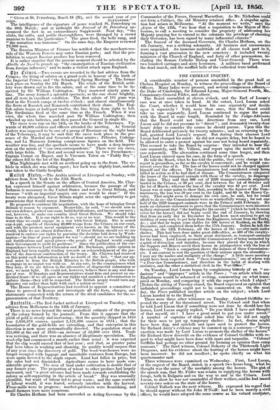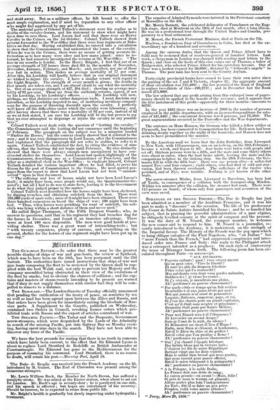THE CRTMEAN INQUIRY.
A considerable number of persons assembled in the great hall at Chelsea Hospital on Monday, to witness the proceedings of the Board of Officers. Many ladies were present, and several conspicuous officers,— the Duke of Cambridge, Sir Edmund Lyons, Major-General Freeth, Mr._ Commissary-General Filder, and others. The Board assembled at eleven &dock, and the Earl of LRCM'S case was at once taken in hand. At the outset, Lord Lucan asked the Court, whether it would hear his ease separately and decide upon it separately ? Told, more than once that the Board could take no case separately, Lord Lucan continued to argue the point with the Board at some length. Reminded by the Judge-Advocate that the Board could not take directions from any one, Lord Lucan said he did not presume to " direct " ; and demanded twenty-four hours' delay to consider the course he should pursue. Upon this the Board deliberated privately for twenty minutes ; and on returning to the hall, granted Lord Lucan's request. But during their absence Lord Lucan had changed his mind : he did not require delay, but he hoped to be allowed to enter a protest against his case not being heard separately. This seemed to take the Board by surprise : they intended to hear the case separately, said Mr. Villiers, and report upon the merits of each case separately. The altercation continued some time longer, and then Lord Lucan entered upon his case, in the form of a speech. He told the Board, what he has told the. public, that every charge in the report is groundless, so far as the cavalry is concerned ; and he would con- trovert every line of it. The loss of the horses could not be charged against himself and the officers. The Commissioners had considered every horse killed in action as if he had died of disease. The Commissioners compared the losses of the transport animals with those of the cavalry, to disparage the latter. They said that 889 out of 2329 transport-animals originally landed in the Crimea, or 38 per cent, died between the 1st of October and the 1st of March; whereas the loss of the cavalry was 42 per cent. Lord Lucan was at some pains to show that, according to the figures of the Com- missioners the logs was 50 per cent in the Light, and 65 in the Heavy Ca- valry. That might seem to damage his own ease he said, but he could afford to do so—the Commissioners were so wonderfully wrou ; for not one half of the 2329 transport-animals were in the Crimea until ebrua.ry. He made an elaborate statement to prove that the Commissioners were incorrect in,their statement that "the hutting for the cavalry" [which he took to mean cover for the horses] did not begin until the end of January, by showing that from an early day in December he had been most anxious to get up stabling of some sort, to get help from the Engineers, labour from the Turks, &c.; and that he began some stables for 300 horses at Kadikoi, en the 6th-- December, and completed them before the 17th January. Before he left the Crimea, on the 13th February, all the horses of the cavalry- were under shelter. This had been done under great difficulties, as 500 of cavalry- horses had been employed, to their great detriment, as transport-animals- for the army. Lord Lucan accused the Commissioners of being animated by a spirit of detraction and injustice, because they placed the way in which the Sappers and Miners saved their horses in juxtaposition with the loss of the cavalry. "Such a comparison shows the animus of these Commission- ers. I am content to rest the question of their animus upon the absurdity— I may say the malice and malignity, of the charge." A little more accuracy might have been expected from "these Commissioners," one of whom was "a Poor-law Commissioner, and therefore in the habit of dealing with statistics, and the other a statistical clerk in the War-Office."
On Tuesday, Lord Lucan began by complaining bitterly of an "au- dacious" and "improper" article in the Times ; "an article which any Englishman would be ashamed of writing, commenting on what trans- pired on Monday, and comparing it with the report to which I object." [Before the sitting of Tuesday closed, the Board expressed an opinion that unfinished proceedings ought not to be commented on. On the next day, the Times published another article on the subject; which Lords Lucan handed in to the Board.] There were three other witnesses on Tuesday. . Colonel Griffiths re- peated the story of his threatened arrest. The Colonel said that when- he told Lord Lucan that if something were not done he should lose his horses, Lord Lucan angrily replied, Do you think I have not thought of that myself, sir ? I have a great mind to put you under arrest."' A number of captains of ships asked him 'why he did not apply for their -men to put up temporary shelter. In fact, drains might have been dug, and sailcloth and spars used to protect the horses. Sir Richard Airey's evidence may be summed up in a sentence—" Every exertion was made by Lord Lucan to promote the shelter of the horses.' Sir Richard threw discredit on the evidence of Colonel Griffiths with re- gard to what might have been done with spars and tarpaulin. "Colonel' Griffiths had perhaps no other ground for forming an opinion than camp rumours." The third witness, Colonel Doherty of the Thirteenth Light Dragoons, said his evidence about the hutting of the homes might have been incorrect : he did not recollect ; he spoke chiefly on what his quartermaster said.
Three witnesses were examined on Wednesday. First, Lord Lucan„ at the request of the Board, stated, in a speech two hours tong, what he thought was the cause of the mortality among the horses. The gist of the speech was, that Mr. Filder was remiss in supplyingthe horses with forage, both in Bulgaria and on the way to and in the Crimea. Lord Lucan, to show he was not unmindful of their welfare, said he had issued. seventy-two orders on the state of the horses.
Colonel Tulloch was the next witness. He expressed his regret that he should appear 'without Sir John M'Neill : had he been merely a civil officer, he would have adopted the same muse as his valued coadjutor,
and staid away. But as a military officer, he felt bound to offer the most ample explanation, and if need be, reparation to any other officer u-ho might feel aggrieved by any act of his. The material parts of Colonel Tulloch's statement were his replies as to deaths of the cavalry-horses, and his statement to show what might have been done to save them. Lord Lucan had said that there were no Heavy Cavalry in the Crimea on the 1st October: Colonel Tulloch showed from returns forwarded to the War-Office that there were four regiments at Bala- klava on that day. Having established this, he entered into a calculation to show that the Commissioners had understated the losses of the cavalry. When he was in the Crimea, there were no means of getting accurate in- formation as to how many were alive and how many joined : since he re- turned, he had minutely investigated the returns at the War-Office. "The loss in six months is fearful. lathe Heavy Brigade, I find that out of an average strength of 727 horses there died 501 in the months of November, December, January, February, and March; and, recollect, not one of these was lost in action. This makes an average mortality of 77 per cent. After this, his Lordship will hardly- believe that in our original statement we wished to injure the cavalry. I have a similar return with regard to the Light Brigade. The strength of every month is given ; the deaths in that month are taken out, and I am almost afraid to say what the mortality is. Out of an average strength of 427, 394 died ; showing an average mor- tality of 92 per cent. These are from the authentic returns, signed, if not
by his Lordship, by. his Lordship's officers His Lordship will now, -perhaps, see that statistics are rather dangerous tools. I must disclaim any intention, as his Lordship imputed to me of instituting invidious compari- sons for the purpose of throwing discredit upon the cavalry. I. perfectly well know all the difficulties under which the cavalry were labouring; and after having shown that there was a mortality of 92 per cent, instead of 42 as we at first stated, I am sure his Lordship will be the last person to say that we ever attempted to disparage or injure the cavalry in any possible
-
way. Colonel Tulloeh next dealt with the question of "butting the cavalry." The Commissioners said the hutting did not commence until the beginning of February. _The paragraph on the subject was by a misprint headed " Shelter for Horses," but the context clearly showed that it referred to the men; and it was very disingenuous in Lord Lucan, after the Commissioners had explaimed that the paragraph did not refer to stables, to refer to it again. Colonel Tulloch established the fact, by citing the evidence of nine officers, that the hutting did not begin until February. He also distinctly • showed that there were always enough men unemployed to have con- structed shelter for themselves. Lord Lucan had spoken slightingly of the
• Commissioners, describing one as a Commissioner of Poor-law ,s and the -other as a statistical clerk in the War-Office : to vindicate himself, Colonel Tulloch detailed the various important offices he had filled, to prove his fitness for the post of Commissioner to the Crimea. He next quoted pas- sages from the report to show that Lord Liman had not been animad- verted" Upon in that document.
"The suffering and loss of horses might not have been Lord Lucan's fault it might haye been, some people would say, the Quartermaster-Ge- neral a ,• but all I had to do was to state facts, leaving it to the Government to do what they judged proper in the matter." Colonel Tulloch next described how the horses might have been sheltered, by digging trenches, and obtaining sailcloth from the fleet. There were 100,000 yards of spare sails; some of it might have been obtained. There were three hundred carpenters on board the ships of war; 100 might have been had. "Thus, when horses were perishing for want of sailcloth, the sail- .cloth was lying within a short distance of them and never used."
- He called Major Thompson, of the Fifth Dragoon Guards ; who, in -answer to questions, said that in his regiment they had trenches dug for the horses in December, and found it an immense advantage. There 'were at least 100 men disposable. The men were good hands at pro- viding shelter. There was a great want of intrenching-tools ; but "with twenty carpenters, plenty of canvass, and everything on the ground, shelter for the horses of one regiment might have been put up in one day."



























 Previous page
Previous page